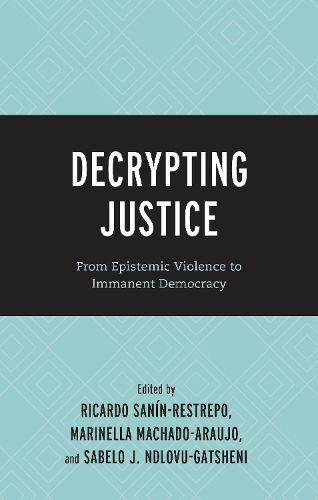Readings Newsletter
Become a Readings Member to make your shopping experience even easier.
Sign in or sign up for free!
You’re not far away from qualifying for FREE standard shipping within Australia
You’ve qualified for FREE standard shipping within Australia
The cart is loading…






This book deploys the theory of encryption of to decrypt justice, setting in opposition Justice, written with the hegemonic capital letters of Western ideas, and justice, in its everyday workings within disparate communal forms and the exercise of multiplicity.
As it decrypts justice, the book argues that late-coloniality, through its construction of the "hidden people," shattered the possibility of true communities in the service of a transcendent model, consisting ofthe market, the constitution, the nation, and the economy. The first three chapters serve as the theoretical backbone of the book, engaging sovereignty, posthumanism, Artificial Intelligence, and epistemic injustice. Chapters 4 and 5 describe the emancipation of the people through alternate communal practices: "Quilombismo" in Brazil and "Corazonar" of Tseltal women in Mexico. Chapter 7 examines the Tosepan's practices in Mexico to decrypt hegemonic territorial forms, and chapters 6 and 8 explore how Western judicial systems disempower the people, focusing on Central American migrants and critiques from the Colombian peace process.
Edited by Ricardo Sanin-Restrepo, Marinella Machado-Araujo, and Sabelo J. Ndlovu-Gatsheni, Decrypting Justice: From Epistemic Violence to Immanent Democracy is a transforming force, not only in the way which we understand reality but also in the tools with which we build it.
$9.00 standard shipping within Australia
FREE standard shipping within Australia for orders over $100.00
Express & International shipping calculated at checkout
This book deploys the theory of encryption of to decrypt justice, setting in opposition Justice, written with the hegemonic capital letters of Western ideas, and justice, in its everyday workings within disparate communal forms and the exercise of multiplicity.
As it decrypts justice, the book argues that late-coloniality, through its construction of the "hidden people," shattered the possibility of true communities in the service of a transcendent model, consisting ofthe market, the constitution, the nation, and the economy. The first three chapters serve as the theoretical backbone of the book, engaging sovereignty, posthumanism, Artificial Intelligence, and epistemic injustice. Chapters 4 and 5 describe the emancipation of the people through alternate communal practices: "Quilombismo" in Brazil and "Corazonar" of Tseltal women in Mexico. Chapter 7 examines the Tosepan's practices in Mexico to decrypt hegemonic territorial forms, and chapters 6 and 8 explore how Western judicial systems disempower the people, focusing on Central American migrants and critiques from the Colombian peace process.
Edited by Ricardo Sanin-Restrepo, Marinella Machado-Araujo, and Sabelo J. Ndlovu-Gatsheni, Decrypting Justice: From Epistemic Violence to Immanent Democracy is a transforming force, not only in the way which we understand reality but also in the tools with which we build it.